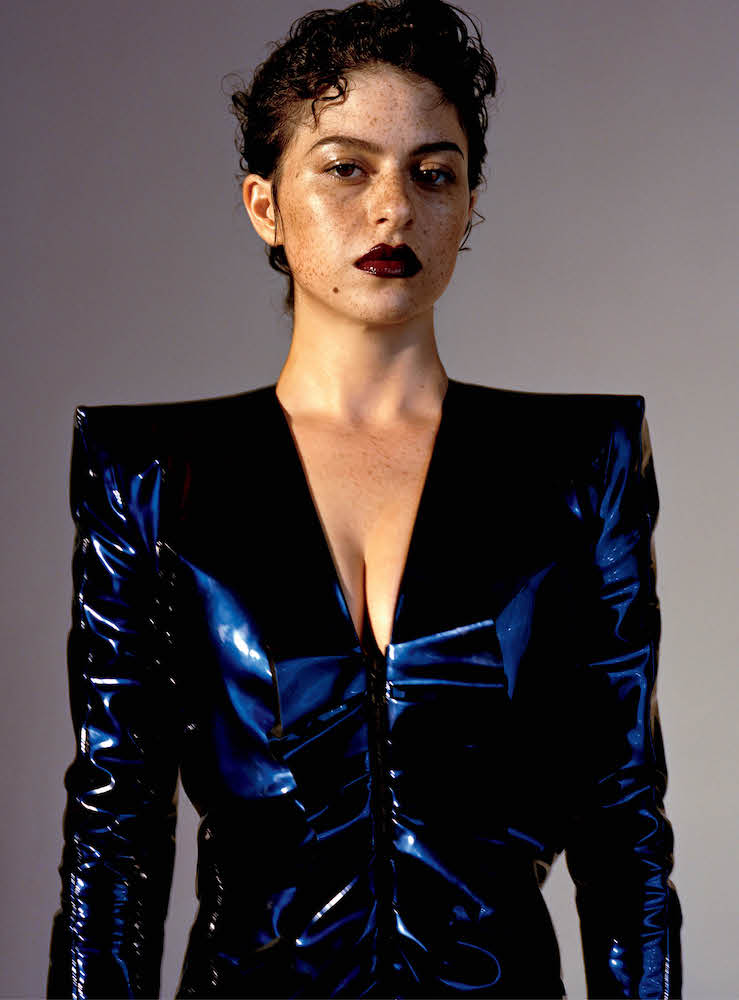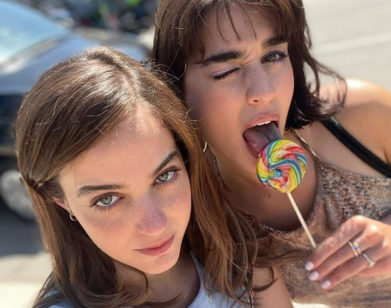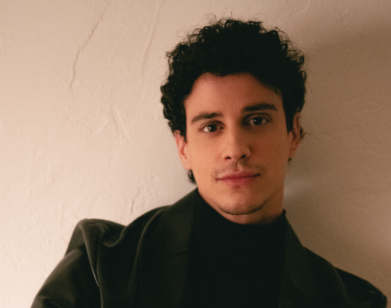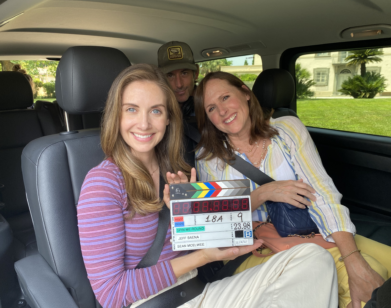Alia Shawkat is the film industry’s renaissance woman
Rare is the 28-year-old actor with almost two decades’ worth of Hollywood experience. Which makes sense, because rare is the 28-year-old actor as special and self-possessed as Alia Shawkat. At the age of 9, she began commuting with her mother between Palm Springs and Los Angeles for auditions and shoots. When she turned 13, she landed her breakout role as the precocious, sarcastic Maeby Fünke on Arrested Development, which Netflix is bringing back for a fifth season next year.
Thanks in part to her wry, smart-girl cred, Shawkat has appeared in a steady succession of indie films including Whip It (2009), The Runaways (2010), Cedar Rapids (2011), and The To Do List (2013). Last year, she cemented her place in the millennial pantheon with a starring role, and a producer credit, on the widely adored TBS series Search Party. The dark satire, which returns for a second season next month, follows Dory, an aimless postgrad living in Brooklyn, who discovers that a college acquaintance has gone missing and embarks on a surreal quest to find her. Over the past few years, Shawkat also co-wrote her first feature film, the forthcoming Duck Butter (in which she also stars), with director Miguel Arteta. Amid her busy schedule, in which she somehow also finds time to sing at jazz clubs and draw disturbing portraits of Donald Trump, Shawkat hopped on the phone with her friend and Hollywood Hills neighbor Aubrey Plaza to discuss Aaron Burr and strip clubs, as one does.
AUBREY PLAZA: This is so great, because now I actually get to talk to you for more than five minutes.
ALIA SHAWKAT: This is how I keep our friendship alive.
PLAZA: And we always have to talk under a supervised circumstance, because otherwise we get really crazy.
SHAWKAT: It would get dark. Now our conversation can be more focused on my career, which is my favorite topic.
PLAZA: Speaking of your career, what the hell do you think you’re doing?
SHAWKAT: [laughs] You tell me, man.
PLAZA: Okay, let me give it to you straight: You were born in Riverside, California. You’re a desert baby. Am I right about this?
SHAWKAT: A desert rat, yeah. You’re very right.
PLAZA: My memory is fucked, but I have a vague sense that we met around the time of Scott Pilgrim vs. the World [2010].
SHAWKAT: It might have been through Michael [Cera], but I feel like we met for the first time at game night at Jeff [Baena]’s house [Plaza’s boyfriend and Shawkat’s friend and poker buddy]. We were probably playing Balderdash. And whether you want it in the interview or not, you and Michael were hanging out.
PLAZA: Well, she really got me this time, I guess.
SHAWKAT: I came by myself. I was trying to make friends in a new city. But then we got closer with The To Do List [2013].
PLAZA: That’s right, we played best friends. But I want to go back in time—how old were you when you knew that you wanted to be an actor?
SHAWKAT: I remember watching All That. Did you ever watch that show? The kid’s SNL.
PLAZA: [sings] “This is all that, this is all that…”
SHAWKAT: You know that’s TLC who sang that?
PLAZA: I was obsessed with that show. Amanda Bynes was amazing.
SHAWKAT: She was amazing. She had her own spin-off show, and I remember auditioning for that. I had to do three impressions.
PLAZA: What impressions?
SHAWKAT: I don’t remember, but I feel like there were three distinct ones. One must have been an old lady, like a Jewish mother or something. That was when I was 9, and I was like, “I want to be on TV.” I knew what I wanted then much more than I do now. But my mom was kind of hesitant about it. Then we got headshots taken, and she’d send them to people, and they’d be like, “She looks too ethnic.” But I still went to L.A., and within the week, I got an agent and a Barbie commercial.
PLAZA: An agent and a Barbie commercial in one week?
SHAWKAT: It was a big week. And then I got a Gap commercial, which never aired, and then, like, the next week I auditioned to play an Iraqi refugee in the David O. Russell movie Three Kings [1999].
PLAZA: I always forget you were in that. How did you deal with rejection as a child? I remember auditioning for things when I was young—and keep in mind I was auditioning for regional Band-Aid commercials in Pennsylvania—but I still faced rejection, and it was really crushing.
SHAWKAT: Actually, it got worse when I was a teenager. At 16 through 20, I doubted everything about myself. But when I was younger, I loved it because we never stayed in L.A. We’d do the audition, then go back to Palm Springs. And if I didn’t get it, I’d be like, “Well, I guess I’m not right for it.” I had such a good head on my shoulders. I don’t know what happened.
PLAZA: You lived like an old, famous Hollywood icon, but as a 9-year-old. Your grandfather was an actor, right?
SHAWKAT: Yes, he was. Paul Burke.
PLAZA: Did you know him?
SHAWKAT: We were very close. He retired in Palm Springs, and when my parents were starting their business, we moved there. He was the star of Valley of the Dolls, and he was in The Thomas Crown Affair, and he had his own TV show—two of them. Naked City was his main one. It got all these Emmys. A lot of up-and-coming New York actors started off on that show: Dustin Hoffman and Gene Hackman had small parts when they were young. I met Robert Redford once at the Sundance Labs and said to him, “My mom told me that you worked on Naked City; that was my grandfather,” and he couldn’t believe it. He was like, “Oh my god, that was one of my first jobs out of theater. It changed my life.” It was kind of cool. Getting to do a show now in New York is kind of an ode to him.
PLAZA: How does it feel to be the star of a television show? [laughs] Does that trip you out sometimes?
SHAWKAT: I thought you’d never ask! It is crazy, I guess. I never thought it would happen. For a while I thought I’d only do indie movies and have to get into real estate or something to make money.
PLAZA: Let’s talk about your cool shit now. I think that you’re probably the coolest person that exists. Part of what I think is cool about you is that you have hobbies and interests outside of “Hollywood.” You like to paint and sing. One time I saw you singing in some speakeasy on the Lower East Side. It was very scandalous.
SHAWKAT: I think I wore a fur that day, and they kicked me out.
PLAZA: What does it feel like to sing onstage?
SHAWKAT: It feels fucking great. With all the attention that comes from being an actor—on set and when doing press—you have to maintain a certain kind of energy and be open and snappy and interactive. When I’m painting or singing, I get to experience a different side of that. With singing, I don’t necessarily have to share my own personality, but I get to be emotional. With jazz, I get to play a different character. I can have a couple of drinks before. It’s not about seeming put-together and alert and sober; I get to be a little messier.
PLAZA: You’re really good at not being so dependent on your job.
SHAWKAT: I think the healthiest thing you can do is to have different experiences so you can use them. If you stay in the same zone, you have nothing to pull from.
PLAZA: How does it feel to go back to Arrested Development after being on that show so long ago, and then again kind of recently.
SHAWKAT: I know the character so well. She’s always going to be this doesn’t-give-a-shit, in-control-of-her-destiny badass—but also kind of stupid. As the title suggests, the character stays the same. The weirder part is coming back after living your life from 14 to 28, and being like, “Right, I was in the same room when I was 15 years old, and now here I am again.”
PLAZA: You co-wrote and star in the movie Duck Butter directed by Miguel Arteta, which hasn’t come out yet. You’re so crazy good in this movie; I can’t wait for people to see it. Did you love the writing process?
SHAWKAT: It’s something that I definitely want to do again, but it takes a lot of time and energy, obviously. Miguel and I had the idea, maybe five years ago, and then we started writing three years ago. I would think about it every day. It haunted me in this great way.
PLAZA: Was it weird to work with Miguel? He’s a really good friend of yours.
SHAWKAT: When we first started writing, we were almost too nice to each other, because we weren’t yet that close. For every idea, we’d be like, “Whatever you like.” By spending so much time together, our relationship naturally evolved to this thing where we’d be like, “No, no, I don’t like that.” We’d fight over stuff, but it wasn’t personal; we were growing closer. We got in this argument over a T-shirt on the first day of shooting. It was just a simple T-shirt, but I lost it. I was like, “I don’t know why you’re fighting me on this! This is what she would wear.” And he was like, “You know it’s not about the shirt, right? It’s exciting and nerve-racking that we’re finally here, because this took so long to get made. It’s going to be amazing, but you have to trust me as much as I trust you.” And we hugged and I cried, and the rest of the experience was cloud nine.
PLAZA: Remember when we did that Drunk History episode together, and we were both hanging out by our trailers dressed as Aaron Burr and … What’s the other guy’s name? Hamilton?
SHAWKAT: [laughs] That’s a very Burr thing to say. Remember we were sitting like dudes and carrying ourselves differently? We were like, “Fuck yeah,” sitting with our legs open. We felt like hot guys.
PLAZA: I honestly can say I’ve never felt happier than when I was in that costume, just walking around having a cup of tea with you and shooting the breeze.
SHAWKAT: We’ve got to dress up like that more often.
PLAZA: We’ll get dinner wearing three-cornered hats and really tall socks. Your dad used to run a strip club, right?
SHAWKAT: He still does. That’s the family biz.
PLAZA: When you were growing up, did you and your brothers know what he did?
SHAWKAT: We knew, and it was never looked at like, “What Daddy does most people don’t like.” It was like, “This is a business.” My dad was always home for dinner, always there to coach our soccer teams. He didn’t have a club life. Sometimes he’d get phone calls at the dinner table where he’d have to yell at somebody in Arabic, and we’d be like, “What the hell happened?” And he’d be like, “Oh, nothing. The gang came and there was a shooting, but it’s fine.”
PLAZA: Your dad is so sweet. He comes over to my house and plays poker.
SHAWKAT: But my dad is Middle Eastern, so having a strip club and having a daughter was kind of strange. It’s something we’ve had to work on as father and daughter. I did a short film about my dad’s strip club, where you don’t know he’s my dad until close to the end.
PLAZA: Right, you directed that.
SHAWKAT: Yeah, it was pretty fun. It was weirder being in the strip club and meeting all the dancers. I don’t judge it—some people look down on strip clubs and think it’s terrible for women. I don’t agree with that, as long as the women are treated well and get paid well.
PLAZA: Some women find it empowering.
SHAWKAT: Totally, and I think it is. And it’s not like we talked about sex a lot at home. My dad likes to imagine me never having a boyfriend or a girlfriend. He doesn’t want to hear about it. But it’s very much part of my life, because I don’t see the shame in sex at all.
PLAZA: Do you have a type? Who are you attracted to?
SHAWKAT: I don’t know. You’ve known me to be single most of my life. I haven’t been in a lot of relationships. I have, like, whatever, intimacy issues.
PLAZA: Honey, we all do.
SHAWKAT: I’m attracted to a certain kind of quiet strength.
PLAZA: That’s a sexy quality.
SHAWKAT: Sometimes they end up being nihilistic assholes, but I’m drawn to that kind of mysterious-strength thing.
PLAZA: So did you see the eclipse?
SHAWKAT: I saw the partial in L.A.
PLAZA: Did you have glasses?
SHAWKAT: I took a hike up to the observatory with some friends, and we borrowed people’s on the way. It was something bigger than us. Like, “Hey, man, we’re all experiencing this one thing, let’s all talk about it.” Normally, no one even smiles at you on a hike, and this time we were all sitting and talking and being like, “Crazy, right?” That part was cool.
PLAZA: I think about that all the time. I feel like you do, too—the idea that, “Look, we’re all small specks in the universe. Everyone needs to calm the fuck down and remember that we’re in this together, man.”
SHAWKAT: Interactions with people are what it’s all about.
PLAZA: Let’s remind each other of that, as we move forward in our careers and in our lives—the projects that we will and will not take on…
SHAWKAT: The press we do and don’t do…
PLAZA: The hats we will and won’t wear…Is there anything else in your career that you hope to do?
SHAWKAT: I’m definitely surfing the wave and trying to be open to what comes. I would love to direct. I’d love to do something with visual art and directing—to get drawings involved with acting. My grandfather said that when he was a struggling actor, he had a dream that he would have Errol Flynn’s dressing room at Fox. And then when he did Valley of the Dolls, which was his biggest movie at the time, he had that dressing room. He said afterward that the biggest mistake he made was that he didn’t set another goal for himself. He became more self-destructive and lost his spirit for acting. That was the best advice. We’re so lucky, and so many people look at our lives and our careers, and they have these projections. But when you’re in it, it’s really easy to be like, “Yeah, but I don’t have that.”
PLAZA: It’s never enough.
SHAWKAT: You always have to set new goals, because that’s the fun of it. I have to be like, “What’s the next thing that seems impossible?”
PLAZA: Let’s never be satisfied. [laughs]
THE SECOND SEASON OF SEARCH PARTY PREMIERES ON TBS NOVEMBER 19. AUBREY PLAZA IS AN ACTRESS AND COMEDIAN WHO MOST RECENTLY APPEARED IN THE INDIE HIT INGRID GOES WEST. NEXT YEAR, SHE WILL REPRISE HER ROLE AS LENNY BUSKER ON THE SECOND SEASON OF FX’s LEGION.







